The Gay, Jewish, Pro-Pot Republican Candidate Has Something to Say
Fred Karger is a candidate for the Republican presidential nomination -- one of five remaining, if you count him.Fred Karger is a candidate for the Republican presidential nomination—one of five remaining, if you count him.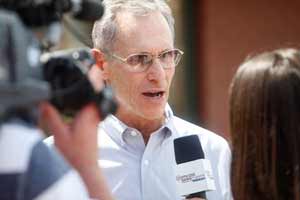
“If gay marriage were legalized, I’d have been married twice — and divorced twice. Just like Newt Gingrich,” says Fred Karger, who makes the comparison pointedly.
Karger, too, is a candidate for the Republican presidential nomination — one of five remaining, if you count him. A moderate who garnered about 1 percent of the vote in Michigan’s open primary, Karger is struggling to join the national dialogue and is gearing up for California’s June 5 ballot.
On a recent balmy Los Angeles evening, the kind that has frothy foliage pumping heady scents down from the Hollywood Hills — scents that inspired designer Tom Ford’s Black Orchid perfume — a crowd of enthusiastic supporters flocks to a Los Feliz residence, galvanized by a single issue rhetorically proffered by one guest as marriage equality.
Stacks of a self-published autobiography are arrayed at the entrance. The title “Fred Who?” offers the only self-deprecation you’ll hear from this candidate, a compact and confident man. And while a presidential run by a Jewish, gay, pro-pot GOP candidate seems an act of all-American kookiness on par, say, with that sword-wielding Coloradoan’s hunt for Osama bin Laden, the 61-year-old Karger takes his campaign seriously, and, judging by his record of activism on behalf of gay marriage, perhaps we should too.
Before he got gay religion, Karger worked for just about every smirking, corporate-shilling GOP hack you can name, living and breathing campaign politics through four decades of getting Republicans elected to office, most notably as a senior consultant to Presidents Ronald Reagan, George H.W. Bush and Gerald Ford.
But he never threw his own hat into the ring until now.
“I was precluded from running myself because I had this secret,” Karger explains. “Because I was gay.”
Karger begins a campaign speech casually leaning against a banister angling into a sunken living room that could make a shelter mag spread. The styled guests are photo-shoot ready too; no Dockers or blue blazers here. And where the Republican businessman in Woody Allen’s “Midnight in Paris” touts California cabernet, here Cotes du Rhone is being served. But Tom Ford isn’t here, nor are the Hollywood stars, the ones who made world news the previous evening for the L.A. premiere of the same-sex marriage play “8.” Their pockets are for the Dems to tap.
The cocktail chatter stops on a dime as the crowd takes in Karger’s articulate, precision delivery. His longtime insider status lets him drop lines that begin, “24 years ago on the Reagan campaign we … .” Karger fleshes out his background, originally an actor who came to Hollywood from Chicago and made it to the Academy Awards; he developed a habit of party crashing that included bum rushing the Oscars (a habit he maintains; when locked out of the Bloomberg/Washington Post debate at Dartmouth that showcased Herman Cain, Karger weaseled his way in, if only to show his face and shake hands).
Karger makes it clear he is to the left of President Obama on many matters. He says he’s for marijuana legalization, wants out of Afghanistan, and he makes an apt comparison to Shirley Chisholm that draws blank looks from a crowd that doesn’t remember the first African-American to seek the Democratic Party’s presidential nomination.
The candidate who developed his allegiance to the Grand Old Party campaigning for Nelson Rockefeller explains he has always held these views and bemoans the loss “of a lot of reasonable Republicans who have left the party and become independents.”
“I’ve become more conservative on one issue: the death penalty,” says Karger. “After working [during George Deukmejian’s campaign for attorney general] with the families of murder victims, I’m for it.”
Despite his connections, Karger doesn’t have the party’s blessing for his presidential run, and doors have been closed to him. For example, in February he was prohibited from opening a booth at the Conservative Political Action Conference, an annual gathering in Washington of American political organizations.
This is an event that once hosted a blood-lusting band of mass-murdering African gangsters. At a CPAC back in the 1980s, this reporter stared in wonder at a recruiting table for RENAMO, which employed child soldiers to perpetrate crimes against humanity, conducted mass killings of civilians, and raped and mutilated noncombatants during raids throughout Mozambique’s decade-long civil war.
But no gays at CPAC, as GOProud discovered last year. Doesn’t fit its worldview.
No problem, Karger’s got something for the organizers: He’s taking legal action against CPAC.
“I fight these at every turn when I’m treated unfairly,” he says.
Well into retirement from his political consulting business, a debacle over the closing of a Laguna Beach gay bar spurred Karger into action. Once on the public stage, Karger found he was in his element and followed up, using his experience and wherewithal to launch a series of successful boycotts and combat his bête noire, the National Organization for Marriage.”No More Mr. Nice Gay,” he says of his reinvention as an activist. Karger founded Californians Against Hate to oppose Proposition 8, the 2008 California ballot measure banning same-sex marriage. He demands a congressional investigation of NOM, which campaigns against gay marriage. He claims to have persuaded the Catholic Church to stop funding the organization, and draws applause when he says “one down, one to go,” the boast referring to the Mormon church. And this is the real focus of his campaign, not to land the GOP nomination but to hit back at the Mormons for their opposition to same-sex marriage and allegedly funding NOM. To that end Karger has fixated on the GOP front-runner, Mitt Romney.
Karger charges that Romney committed voter fraud by living primarily out of state and casting a ballot in the Massachusetts special election won by Scott Brown. Karger has also joined the inevitable public discussion (and criticism) of Romney’s religion by launching a website, Top 10 Craziest Mormon Beliefs, that mocks the Mormon faith.
Though the odds are against him, just the notion of an openly gay GOP candidate is empowering to many homosexuals, a demographic frustrated at being treated like second-class citizens. Bill Mahoney, a radio personality and Internet radio consultant who followed Karger to New Hampshire and is producing a documentary on the candidate, found a surprising outpouring of support.
“He had people at colleges approaching him, opening up for consolation,” Mahoney said at the Los Feliz event. “One reporter covering the race broke down. [She said] her son wasn’t accepted by her husband. He’s fighting for those people.
“He’s creating a conversation around equality. He’s a trailblazer, particularly within the Republican Party.”
By the end of the night, this reporter is convinced that this recidivist party crasher is seemingly the most reasonable Republican candidate still in the presidential race, certainly among a field narrowed to a job-liquidating billionaire and a morose man with a penchant for cuddling the dead.
“My goal is to get into a debate,” Karger says, though with the cancellation after we spoke of a March 19 GOP debate, none remain scheduled. From the get-go, the campaign strategy was reliant on gaining exposure by participating in a televised debate. Beaming as a staffer forks over a fistful of donation envelopes, he says, “If I do, anything is possible.”
Your support matters…Independent journalism is under threat and overshadowed by heavily funded mainstream media.
You can help level the playing field. Become a member.
Your tax-deductible contribution keeps us digging beneath the headlines to give you thought-provoking, investigative reporting and analysis that unearths what's really happening- without compromise.
Give today to support our courageous, independent journalists.
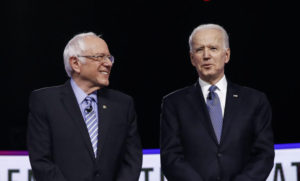
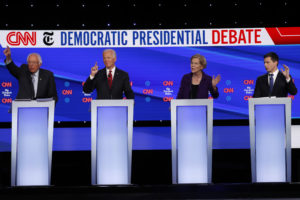

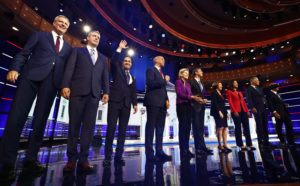
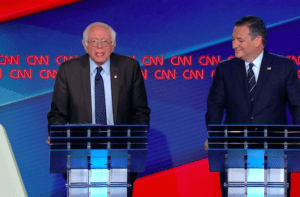
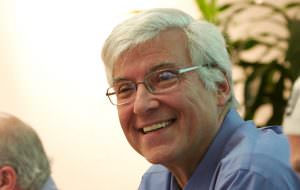
You need to be a supporter to comment.
There are currently no responses to this article.
Be the first to respond.